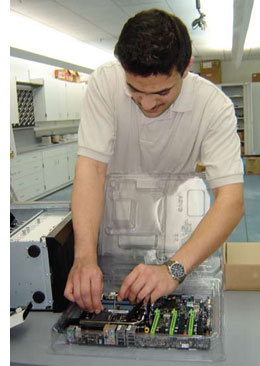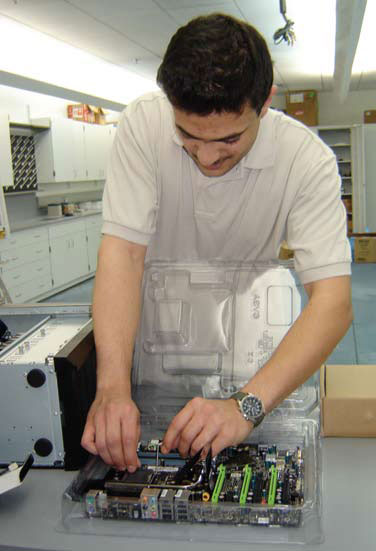
When people enter the new home of Carnegie Mellon Qatar in Doha's Education City, they're often overwhelmed by the structure's beauty. And coming this year, they'll also be greeted with "hello" or "marhaba" from a robot named Hala.
"Hala," whose name means "welcome" in all Arabic dialects, is the new "roboceptionist" in Education City. A "sister" robot to "Tank," who debuted at Newell-Simon Hall on the Pittsburgh campus in September 2005, Hala is part of a new project sponsored by the Qatar National Research Fund and Qatar's Undergraduate Research Experience Program to investigate human-robot interaction in a mixed cultural setting.
She's able to answer questions in English and Arabic about both Education City and Carnegie Mellon's home campus in Pittsburgh. Brett Browning, a senior systems scientist with the Robotics Institute in Qatar, says the goal was to devise robots that can interact with visitors in culturally appropriate ways.
Using cameras and pattern recognition software, Hala can detect whether an approaching guest is male or female. She's also able to tell if someone is wearing traditional Gulf dress or Western clothing. That helps to determine whether she initiates a conversation in English or Arabic. Because gestures and facial expressions carry different meanings to Arabic and English speakers, Hala is also tuned to react in culturally sensitive ways, Browning says.
Hala is being developed by an inter-campus, multi-national team. In Pittsburgh, the team includes Reid Simmons--research professor of robotics and developer of Carnegie Mellon's first roboceptionist in 2004--and robotics doctoral student Maxim Makatchev. The Qatar team includes associate teaching professor Majd Sakr; Browning; and research staff Ameer Abdulsalaam, Imran Fanaswala and Wael Al Ghazzawi. Undergraduate students Hatem Alismail (CS'09), Keghani Kouzoujian (CS'09) and Wadha Al-Adgham (CS'09) also contributed.
Alismail and Kouzoujian went to Pittsburgh in the summer of 2008 to work alongside the creators of Tank. "I wanted to learn more about robots and get more involved in research," Kouzoujian says. "The roboceptionist allows us to put things into action in a way that will have a lasting impact on campus. And it's pretty cool, too."
Hala has a pan-Arabic personality--her gestures reflect a variety of middle Eastern influences instead of one specific nation or culture--and speaks without a local dialect. The team made her female since most students at Education City are women.
Although Hala isn't mobile, Browning envisions the day when she might have wheels that allow her to move freely around the building. "Not only could she tell people where they needed to go, she could actually show them," he says.
Browning also hopes the Hala project and the monetary support from the Qatar Foundation will entice other students to join the culture of research being cultivated in Qatar. "This is just the start of introducing robots to the Gulf," he says. "Qatar is a society that is transforming itself in an unprecedented way. It's a great place for robots and artificial intelligence to have a huge impact."
"Hala," whose name means "welcome" in all Arabic dialects, is the new "roboceptionist" in Education City. A "sister" robot to "Tank," who debuted at Newell-Simon Hall on the Pittsburgh campus in September 2005, Hala is part of a new project sponsored by the Qatar National Research Fund and Qatar's Undergraduate Research Experience Program to investigate human-robot interaction in a mixed cultural setting.
She's able to answer questions in English and Arabic about both Education City and Carnegie Mellon's home campus in Pittsburgh. Brett Browning, a senior systems scientist with the Robotics Institute in Qatar, says the goal was to devise robots that can interact with visitors in culturally appropriate ways.
Using cameras and pattern recognition software, Hala can detect whether an approaching guest is male or female. She's also able to tell if someone is wearing traditional Gulf dress or Western clothing. That helps to determine whether she initiates a conversation in English or Arabic. Because gestures and facial expressions carry different meanings to Arabic and English speakers, Hala is also tuned to react in culturally sensitive ways, Browning says.
Hala is being developed by an inter-campus, multi-national team. In Pittsburgh, the team includes Reid Simmons--research professor of robotics and developer of Carnegie Mellon's first roboceptionist in 2004--and robotics doctoral student Maxim Makatchev. The Qatar team includes associate teaching professor Majd Sakr; Browning; and research staff Ameer Abdulsalaam, Imran Fanaswala and Wael Al Ghazzawi. Undergraduate students Hatem Alismail (CS'09), Keghani Kouzoujian (CS'09) and Wadha Al-Adgham (CS'09) also contributed.
Alismail and Kouzoujian went to Pittsburgh in the summer of 2008 to work alongside the creators of Tank. "I wanted to learn more about robots and get more involved in research," Kouzoujian says. "The roboceptionist allows us to put things into action in a way that will have a lasting impact on campus. And it's pretty cool, too."
Hala has a pan-Arabic personality--her gestures reflect a variety of middle Eastern influences instead of one specific nation or culture--and speaks without a local dialect. The team made her female since most students at Education City are women.
Although Hala isn't mobile, Browning envisions the day when she might have wheels that allow her to move freely around the building. "Not only could she tell people where they needed to go, she could actually show them," he says.
Browning also hopes the Hala project and the monetary support from the Qatar Foundation will entice other students to join the culture of research being cultivated in Qatar. "This is just the start of introducing robots to the Gulf," he says. "Qatar is a society that is transforming itself in an unprecedented way. It's a great place for robots and artificial intelligence to have a huge impact."
Image2:

For More Information:
Jason Togyer | 412-268-8721 | jt3y@cs.cmu.edu

